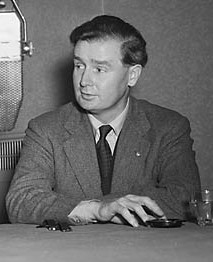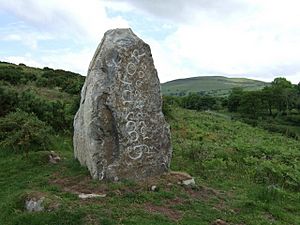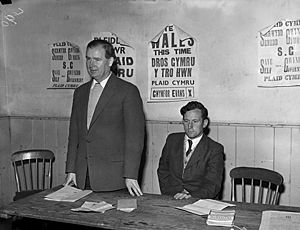Gwynfor Evans facts for kids
Quick facts for kids
Gwynfor Evans
|
|
|---|---|

Evans in 1951
|
|
| President of Plaid Cymru | |
| In office 1945–1981 |
|
| Preceded by | Abi Williams |
| Succeeded by | Dafydd Wigley |
| Member of Parliament for Carmarthen |
|
| In office 14 July 1966 – 18 June 1970 |
|
| Preceded by | Megan Lloyd George |
| Succeeded by | Gwynoro Jones |
| In office 10 October 1974 – 3 May 1979 |
|
| Preceded by | Gwynoro Jones |
| Succeeded by | Roger Thomas |
| Personal details | |
| Born |
Gwynfor Richard Evans
1 September 1912 Barry, Wales |
| Died | 21 April 2005 (aged 92) Pencarreg, Carmarthenshire, Wales |
| Political party | Plaid Cymru |
| Spouse |
Rhiannon Prys Thomas
(m. 1941–2005) |
| Children | 7 |
| Alma mater | University of Wales, Aberystwyth St John's College, Oxford |
Gwynfor Richard Evans (born 1 September 1912 – died 21 April 2005) was an important Welsh politician, lawyer, and writer. He was the leader (President) of the Welsh political party Plaid Cymru for 36 years.
He was also the first person from Plaid Cymru to become a Member of Parliament (MP) in Westminster. An MP is someone elected to represent a group of people in the UK Parliament. He was an MP twice: first from 1966 to 1970, and again from 1974 to 1979.
When he first joined Parliament, he tried to take his oath (a promise) in the Welsh language. This was not allowed at the time, but he was the first MP to try. Later, in 1974, MPs were finally allowed to take their oath in any of the UK's native languages. One of his biggest achievements was successfully campaigning for a Welsh-language television channel, which is now called S4C.
Contents
Early Life and Education
Gwynfor Evans was born in Barry, a town near Cardiff, Wales. His father owned shops, and his mother ran a china shop. His mother spoke Welsh fluently.
Gwynfor went to Gladstone Road School and then Barry County School. He was good at sports, captaining the cricket and hockey teams. Even though he started learning Welsh at school, he didn't become fully fluent until he was 17.
He later studied at the University of Wales, Aberystwyth and St John's College, Oxford. He became a lawyer. When he was a teenager, the Welsh nationalist party Plaid Cymru was started in 1925. Gwynfor even started a branch of the party while he was at Oxford. He became the party's president in 1945 and stayed in that role until 1981.
Beliefs and Campaigns
Gwynfor Evans was a pacifist, meaning he believed that all violence is wrong. During World War II, he was a conscientious objector. This meant he refused to fight in the war because of his strong beliefs. A special group looked at his case and agreed that his beliefs were very strong, so he didn't have to join the army.
He is known for keeping Plaid Cymru going strong during difficult times in the 1940s and 1950s. In the 1950s, he campaigned for a Welsh parliament, which is like a Welsh government, but he didn't succeed then. He also tried to stop the building of a dam on the Tryweryn River. This dam would flood the Welsh-speaking village of Capel Celyn to provide water for Liverpool. This event was a very famous and sad moment in Wales in the early 1960s.
In 1962, Gwynfor was involved in a group that won a license to start a TV channel for western and northern Wales. However, the plan didn't work out because of money problems.
Becoming an MP
Gwynfor Evans was elected to the Carmarthenshire County Council in 1949 and stayed there for 25 years. He was often the only Plaid Cymru member on the council. People even nicknamed him "Evans dual carriageway" because he always talked about improving roads.
He tried to become an MP several times before his big win. On 14 July 1966, Gwynfor Evans won the parliamentary seat for Carmarthen in a special election called a by-election. A by-election happens when an MP leaves their seat before the next general election. This victory was a huge moment for Plaid Cymru.
When he arrived in the House of Commons, another MP showed him around. He was warned not to sit at the Welsh Labour table in the tea room because his name was "mud" among them. This showed how much his victory had shaken up Welsh politics.
Later Elections and Time in Parliament
In the 1970 general election, Gwynfor lost his Carmarthen seat. He tried again in February 1974 but lost by only three votes! However, he won the seat back in October 1974. This time, two other Plaid Cymru MPs joined him in Parliament.
He lost his Carmarthen seat again in the 1979 general election and did not run for Parliament after 1983.
As an MP, Gwynfor stuck to his pacifist beliefs. He was one of the few MPs who spoke out against the British government sending weapons to Nigeria during its civil war (1967–1970). He also opposed the Vietnam War. When he couldn't enter Vietnam as part of a group, he protested outside a US air base in Thailand instead.
He was also the first president of the Celtic League, an organization that promotes cooperation between Celtic nations, from 1961 to 1971.
Later Life and Legacy
In 1980, Gwynfor Evans made a very strong statement. The government had promised a Welsh-language television channel but then seemed to change its mind. Gwynfor threatened to go on a hunger strike, meaning he would refuse to eat. This serious threat made the government quickly change its mind, and the Welsh-language channel S4C started broadcasting on 1 November 1982.
After he retired from politics, he became a very busy writer. He mostly wrote about Welsh topics in Welsh, and his books were often translated into English. His book Aros Mae (It Endures), a history of Wales, became a best-seller.
Family Life
In 1941, Gwynfor Evans married Rhiannon Prys Thomas. They had seven children. His daughter, Meinir Ffransis, became a well-known activist for the Welsh language.
Death and Tributes
Gwynfor Evans passed away at his home in Pencarreg on 21 April 2005, at the age of 92.

After his death, many important Welsh politicians spoke about his impact:
- Dafydd Iwan, the President of Plaid Cymru, said that without Gwynfor, Plaid Cymru might not have survived. He added that Wales might not be seen as a nation today without Gwynfor's influence.
- Rhodri Morgan, the First Minister of Wales, said that Gwynfor made a huge contribution to Welsh public life, especially by making Wales and Welsh issues more visible.
- Peter Hain, the Secretary of State for Wales, remembered Gwynfor especially for his work in getting Welsh language broadcasting.
- Nick Bourne, the leader of the Welsh Conservative Party, said Gwynfor was a highly respected figure who greatly contributed to Welsh politics.
- Mike German, the leader of the Welsh Liberal Democrats, said Gwynfor earned respect from all political groups and that his passing marked the end of an important time in Welsh politics.
There have been campaigns to build memorials for Gwynfor Evans. In 2010, a bronze statue of him was unveiled at Barry Library, the town where he was born.
See also
 In Spanish: Gwynfor Evans para niños
In Spanish: Gwynfor Evans para niños
 | Charles R. Drew |
 | Benjamin Banneker |
 | Jane C. Wright |
 | Roger Arliner Young |


